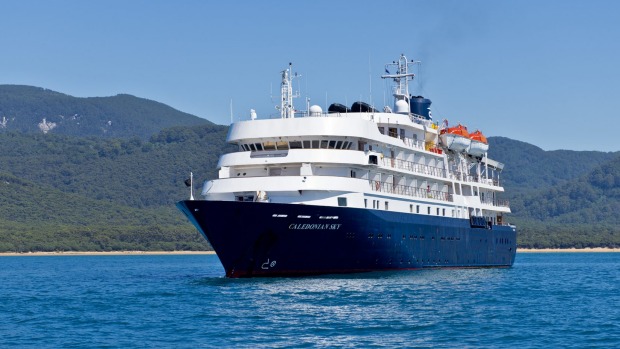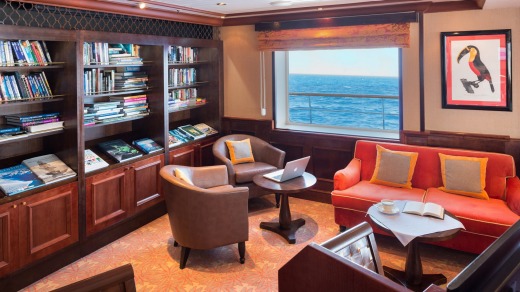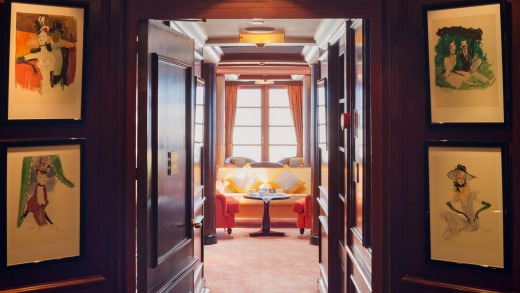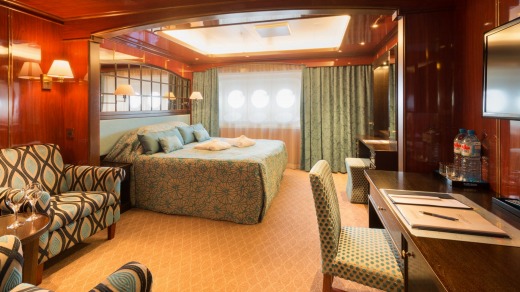
"Small ship, big family," says the Second Officer on MS Caledonian Sky. By the nostalgic smile, I assume he's been away from home long enough to recall only the hugs and home-cooked food and none of the psychological warfare.
Though, whatever the sentiment, he's right: a small ship is like a large family with its mix of individuals required to function, for a time, as a single live-in entity. That's not easy for everyone, but understanding your own and others' personality types can help you navigate the social aspect of a relatively intimate style of cruising and avoid hell in a hull.
My own small ship cruise experiences have included a fortnight on passenger-cargo vessel Aranui 3 exploring French Polynesia's Marquesas Islands, five weeks through the Mediterranean and across the Atlantic on four-masted barquentine Star Clipper, and this 17-day expedition through maritime Southeast Asia. They are all very different types of vessels, yet with similarly low passenger and crew capacities.

On expedition ship Caledonian Sky, I'm one of only 100 passengers and there are 75 crew; few enough souls on a long enough trip to activate the unspoken expectation of engagement, or at the very least acknowledgement, as you constantly cross paths with fellow shipmates.
As a travel experience, you're not sitting thigh-to-thigh with a complete stranger on a long-haul flight or standing inches from others on peak-hour public transport or lined up together at a busy tourist attraction, but there are elements and moments of these, with the added intensity of shared meals and activities.
If an extrovert is someone who gets energy from socialising, small ship cruising offers an ideal environment to meet and converse with lots of new people, even several at once, many times a day, day after day.

If an introvert is someone who requires more solitary time and space, and too much personal interaction (especially of the wrong kind) can zap energy reserves, choosing to small ship cruise may seem as terrific an idea as a claustrophobe crawling headfirst into a sleeping bag and getting someone to zip it up behind them.
If you're not sure where you are on the introversion-extroversion spectrum – terms often mistakenly interchanged, respectively, with shyness and sociability – my sister swears by the Myers-Briggs Type Indicator. Over the years, she's coerced everyone in the immediate family, and our partners, to sit down and answer its 93 forced-choice questions. And, actually, the comprehensive results have helped a far-flung family of extreme introverts through to moderate extroverts to be much better house guests for each other through an appreciation of what makes each of us individually tick. Or withdraw. Or get animated. Or crash.
Yet, just as people with a peaches and cream complexion, predisposition to carsickness or moderate lactose intolerance don't have to miss out on sunshine, road trips or their favourite soft cheeses if they plan ahead and manage things properly, introverts can comfortably small ship cruise as long as they pack some strategies.

One particular passenger on board Caledonian Sky quietly shows, with style and grace, how it's done. Most noticeable to me are her damage-control tactics around the meal situation – by far the most intense social component of a small ship cruise – for which she and her companion are invariably seated at a table set for two. I also note that when she choses not to eat in a communal space, he shares a table with other passengers.
This rather introverted seasoned cruiser tells me she always approaches hotel staff directly.
On Caledonian Sky, she's advised to arrive to meals a few minutes early to secure a smaller table, of which there are far fewer than those for four or more diners. Cruise crews are always your go-to; they've seen and been asked just about everything and will probably know what you're going to say before you even open your mouth.

And ships always have quiet places. This one has a library in the lounge and an outdoor deck area that's usually empty apart from the captain sun-tanning and feigning sleep. Cabins are roomy and all have portholes, a large window or a private balcony, so it takes a lot to feel cooped up or confined. Then there are the quieter times on board: early morning, late evening or when everyone's off on a shore excursion you'd rather skip.
Our captain is sociable and gracious, but doesn't seek out the loud crowd and is most often seen dining quietly with a few others or tanning on deck in nothing but mirrored sunglasses and fluorescent pink shorts.
"This is what I look like with my clothes on," is his opening line to the crowd at the captain's welcome cocktail party. Two weeks later, at the farewell cocktail party, he and I easily fall into an interesting in-depth 15-minute conversation at the lounge door, where he's welcoming people.

That evening's speech begins: "I'm going to read you a story. You might have heard it, but I don't care because I'm the captain", and he shares a letter written to him by a child about how lucky ship captains are because they are smart and attractive but don't have to do any work.
My guess is that the captain is fairly introverted, though perhaps all sailors are.
According to the Myers-Briggs scale, I'm about the middle on the introversion-extroversion spectrum. My own small ship cruise routine, developed over many nautical miles and easily adapted to Caledonian Sky, supports this theory.
I take breakfast alone in my cabin every morning; there isn't room service, but nobody's going to stop anyone from getting a take-away from the breakfast buffet. Hotel staff soon get so used to my regular procedure that someone's always holding out the appropriate cutlery by the time I've collected my usual supplies.
Buffet lunches are casual enough that people come and go over a couple of hours and there's no problem excusing yourself from a table before everyone's finished, so I'm a consistently social eater in the middle of the day.
During the first week, I skip dinner a few times when I don't feel I quite have the energy for another three-course à la carte dinner potentially peppered with political and gender issues debate – as fun as that can be if I'm in the mood – or stilted chit-chat that drains me like an unplugged sink. Though once I get my own little like-minded possie going, a two to three-hour dinner is always over too soon.
Most evenings, when the trivia or live music is winding down or over, I stroll around the accessible decks for fresh air and jog up and down the aft stairs for exercise. There's rarely anyone around except Russian engineers smoking off the back who I didn't even know were on the ship until halfway through the cruise.
Transfers and shore excursions are another time you tend to be surrounded by people and there's a bit of an expectation to interact. Usually it's just while walking off the ship or sitting in a Zodiac. Though, in the extreme, you might find yourself on a long coach ride with a guide who shouts though the PA system for a couple of hours, then falls asleep on your shoulder, but I always carry a fully charged iPod and the ability to giggle.
After 16 days, however, I put two fingers up in front of the ornithologist's binoculars then realise every idiot does that, I stop being able to hold conversations with more than one person at a time, and I start to wonder if the people I've been enjoying the company of for two weeks really like me after all.
The introvert in me says it's time to go home for a recharge.
MORE INFORMATION
aptouring.com.au
CRUISING THERE
APT sails many of the world's seas and rivers. The company owns and operates three small ships – MS Caledonian Sky, MS Island Sky, MS Hebridean Sky – for expedition-style trips in Asia, Northern Europe and the Kimberley. Fares for the Seven Seas Odyssey, which will be called 17-day South East Asia Adventure in 2016, are from $11,995 per person, twin share. APT has an all-inclusive pricing policy. . Phone 1300 196 420; see aptouring.com.au.